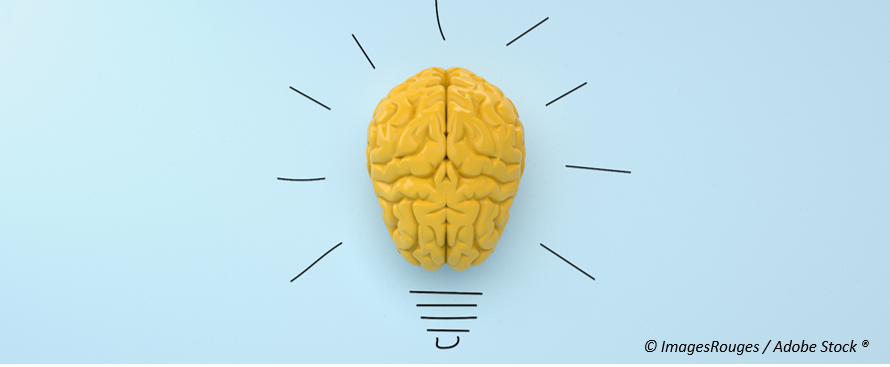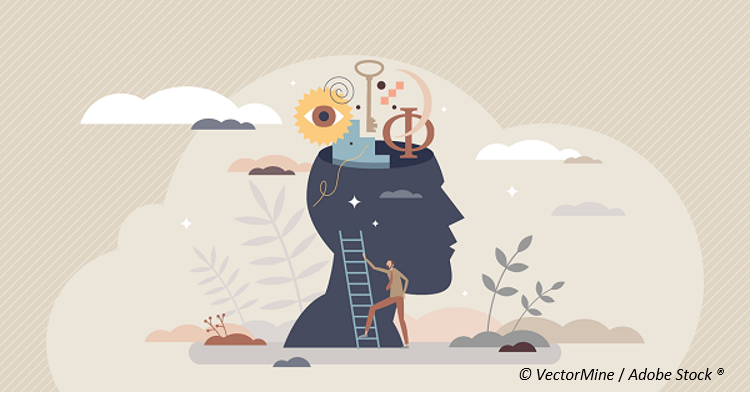Why does our notion of intelligence impact our learning potential?
Monday, October 18, 2021, 9:30 a.m., Salle Grainetier, Silvae, Montrouge.
Two learners start a course. They know each other well and one says to the other: “I’m not worried about you, you’ll manage to understand and learn everything, you’re lucky, you’re intelligent and you’ve always had a gift for learning”. This fixated notion of intelligence as a gift, as an innate and fixed ability , is one of the notions of intelligence. Although implicit, our own notion of intelligence and our cognitive abilities have a great influence on our learning potential and we will explain why.

What is intelligence?
First of all, before talking about the notion of intelligence, let us define it. We choose a generic, conservative and consensual definition: “intelligence is the ability to adapt to the external world” (Dehaene et al., 2018, p.85).
Psychology has been studying intelligence for more than a century, and several theorists have contributed to our current understanding.
In the early 19th century, intelligence was considered an innate biological characteristic. Phrenology assumed that a person’s mental faculties could be guessed from the bumps on their skulls in the areas of the brain thought to be the seat of certain abilities. It is Gall who is at the origin of this trend and from where the expression “a maths whizz” derives.
A little later, intelligence was considered to be inversely proportional to reaction time on certain tests.
This century of research has put us on the path to measuring intelligence via behavioural indices. This is the origin of the psychometric approach, a field of psychology that uses measurement scales and statistics to study mental faculties.
But how do we measure this concept, which is found in a very wide range of activities?
The first measure of intelligence dates from 1905, the Binet-Simon test (1908). This test gave rise to the notion of IQ, which at the time was the ratio of mental age to chronological age.
30 years later, Thurstone contributed to research on the subject by proposing a model with seven factors that characterise forms of intelligence such as verbal fluency, numerical skills or spatial skills.
From the 1960s onwards, other researchers developed models adopting different points of view. Guilford’s creativity (1967) and Cattell’s fluid and crystallised intelligence (1971) were born. Cattell joined forces with Horn and Carroll and they developed the CHC (Cattell-Horn-Carroll) model (Cattell, 1971; Horn, 1965; Carroll, 1993).
Fluid intelligence is the general ability to adapt to new situations independently of previously acquired knowledge. Crystallised intelligence is the general ability to use previously acquired knowledge, experience and skills. This notion of fluid and crystallised intelligence is still relevant today. According to the CHC model, fluid intelligence feeds crystallised intelligence (novelties eventually become prior knowledge and become part of experience).
Why does our notion of intelligence increase or limit our learning potential?
Today, theories of intelligence underpin our representations (Dweck & Leggett, 1988):
– Fixed theory (or innate theory or mindset theory) – fixed mindset: human abilities are fixed and do not change during life
– Incremental theory – Growth Mindset: human abilities develop, it is possible to have an effect on them
These theories can become implicit, i.e. influence our judgements without our being aware of it.
In the fixist notion, intelligence is a potential that does not develop. This belief is often associated with the biological theories of the 19th century (brain size, being good at maths), which have now been invalidated by neuroscience.
The work of Dweck and Leggett questions the relationship between implicit theories of intelligence and learning goals. These beliefs have an impact on students and their relationship with school. From birth, human beings are endowed with intelligence and internalise norms and beliefs linked to their family and school environment. Take the example of a bad mark. A student who believes that intelligence is fixed will interpret this mark as reflecting his or her inability and incompetence, in contrast to a student who believes that intelligence is evolving. Implicit theories therefore guide school behaviour. Knowing these notions allows for individual and collective adaptation of strategies and feedback to learners and trainers (Da Fonseca, 2019).
What are the impacts of these notions on adult learning?
The trainer’s beliefs about intelligence have an effect on their education and impact on their feedback to learners. He may unknowingly reinforce the learners’ fixative beliefs and limit their learning. In contrast, a trainer who is ‘incremental’ will be better able to support learners in their professional development and open them up to their learning potential.
Similarly, a learner who believes that intelligence is innate, if he or she fails, may resign himself or herself to the fact that learning will not increase his or her abilities.
Educational sciences have shown that beliefs developed during childhood shape our relationship with knowledge and lifelong learning. In addition to the importance of deconstructing neuromyths, the work carried out on l’apprendre à apprendre [Learning to learn] allows us to better understand the mechanisms of learning and to l’apprenance (Carré, 2005, 2020). The IFCAM educates on these subjects in various ways: through learning exhibitions such as ” Apprendre, le cerveau livre ses secrets “by training its trainers through the dispositif Camp’use and by making training resources available to all on its blog.
Camille Besson, Instructional Designer & Dorothée Cavignaux-Bros, Training Engineer
Bibliography :
Binet, A. & Simon, T. (1908). Le développement de l’intelligence chez les enfants. L’Année Psychologique, 14, 1-95.
Carré, P. (2005). L’apprenance, vers un nouveau rapport au savoir. Paris : Dunod.
Carré, P. (2020). Pourquoi et comment les adultes apprennent – De la formation à l’apprenance. Paris : Dunod.
Carroll, J. B. (1993). Human cognitive abilities – A survey of factor-analytic studies. Cambridge University Press.
Cattell, R. B. (1971). Abilities : Their structure, growth, and action. New York : Houghton Mifflin.
Da Fonseca, D. (2019). Comment donner le meilleur de soi à l’école ? Rôle des théories implicites. Dans C. Martin-Krumm et al. (dirs.), Psychologie positive (pp 203-216). Dunod.
Dehaene, S., Le Cun, Y. & Girardon, J. (2018). La plus belle histoire de l’intelligence. Robert Laffont.
Dweck, C. S. & Leggett, E.L. (1988). A social-cognitive approach to motivation and personality. Psychological Review, 95(2), 256-273.
F. J. Gall dans S. Vieillard (2019). Cours de Psychologie Cognitive sur l’Intelligence Humaine. Université Paris Nanterre.
Guilford, J.P. (1967). The nature of human intelligence. McGraw-Hill.
Horn, J. L. (1965). Fluid and crystallized intelligence : A factor analytic study of the structure among primary mental abilities [Ph. D. University of Illinois]. ProQuest Dissertations Publishing.









